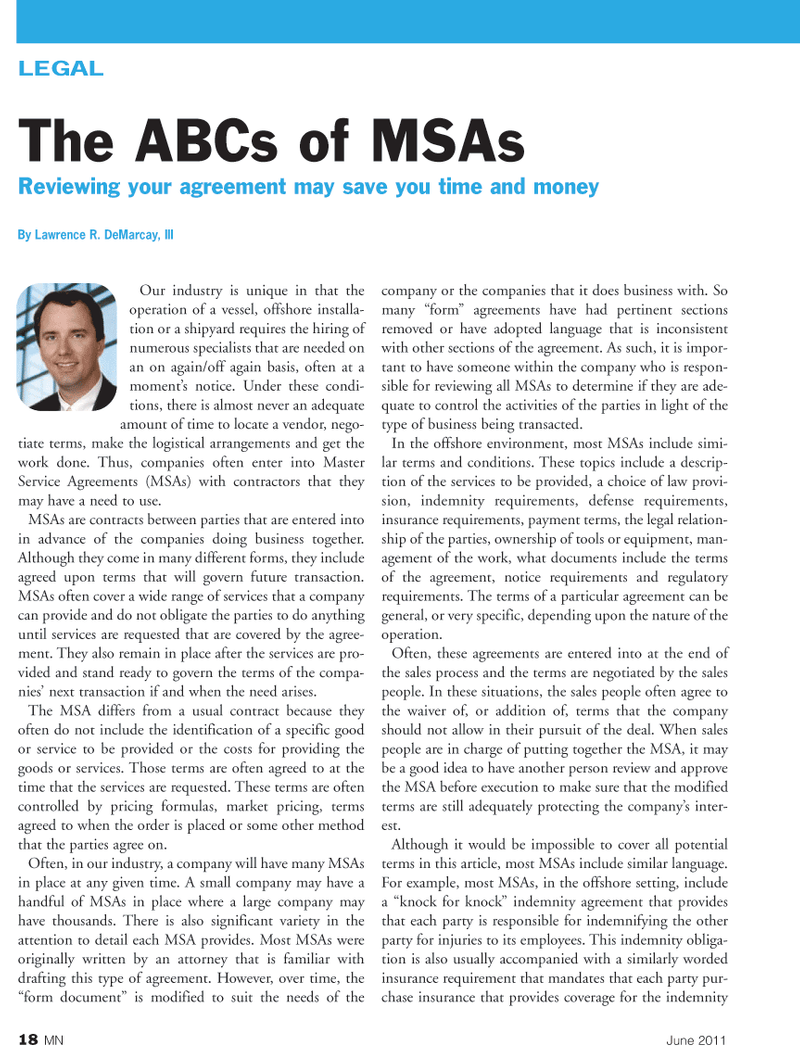
Page 18: of Marine News Magazine (June 2011)
CEO Six-Pack: The Leadership Edition
Read this page in Pdf, Flash or Html5 edition of June 2011 Marine News Magazine
18 MN June 2011
LEGAL
Our industry is unique in that the operation of a vessel, offshore installa- tion or a shipyard requires the hiring of numerous specialists that are needed on an on again/off again basis, often at a moment’s notice. Under these condi- tions, there is almost never an adequate amount of time to locate a vendor, nego- tiate terms, make the logistical arrangements and get the work done. Thus, companies often enter into Master
Service Agreements (MSAs) with contractors that they may have a need to use.
MSAs are contracts between parties that are entered into in advance of the companies doing business together.
Although they come in many different forms, they include agreed upon terms that will govern future transaction.
MSAs often cover a wide range of services that a company can provide and do not obligate the parties to do anything until services are requested that are covered by the agree- ment. They also remain in place after the services are pro- vided and stand ready to govern the terms of the compa- nies’ next transaction if and when the need arises.
The MSA differs from a usual contract because they often do not include the identification of a specific good or service to be provided or the costs for providing the goods or services. Those terms are often agreed to at the time that the services are requested. These terms are often controlled by pricing formulas, market pricing, terms agreed to when the order is placed or some other method that the parties agree on.
Often, in our industry, a company will have many MSAs in place at any given time. A small company may have a handful of MSAs in place where a large company may have thousands. There is also significant variety in the attention to detail each MSA provides. Most MSAs were originally written by an attorney that is familiar with drafting this type of agreement. However, over time, the “form document” is modified to suit the needs of the company or the companies that it does business with. So many “form” agreements have had pertinent sections removed or have adopted language that is inconsistent with other sections of the agreement. As such, it is impor- tant to have someone within the company who is respon- sible for reviewing all MSAs to determine if they are ade- quate to control the activities of the parties in light of the type of business being transacted.
In the offshore environment, most MSAs include simi- lar terms and conditions. These topics include a descrip- tion of the services to be provided, a choice of law provi- sion, indemnity requirements, defense requirements, insurance requirements, payment terms, the legal relation- ship of the parties, ownership of tools or equipment, man- agement of the work, what documents include the terms of the agreement, notice requirements and regulatory requirements. The terms of a particular agreement can be general, or very specific, depending upon the nature of the operation.
Often, these agreements are entered into at the end of the sales process and the terms are negotiated by the sales people. In these situations, the sales people often agree to the waiver of, or addition of, terms that the company should not allow in their pursuit of the deal. When sales people are in charge of putting together the MSA, it may be a good idea to have another person review and approve the MSA before execution to make sure that the modified terms are still adequately protecting the company’s inter- est.
Although it would be impossible to cover all potential terms in this article, most MSAs include similar language.
For example, most MSAs, in the offshore setting, include a “knock for knock” indemnity agreement that provides that each party is responsible for indemnifying the other party for injuries to its employees. This indemnity obliga- tion is also usually accompanied with a similarly worded insurance requirement that mandates that each party pur- chase insurance that provides coverage for the indemnity
The ABCs of MSAs
Reviewing your agreement may save you time and money
By Lawrence R. DeMarcay, III

 17
17

 19
19
